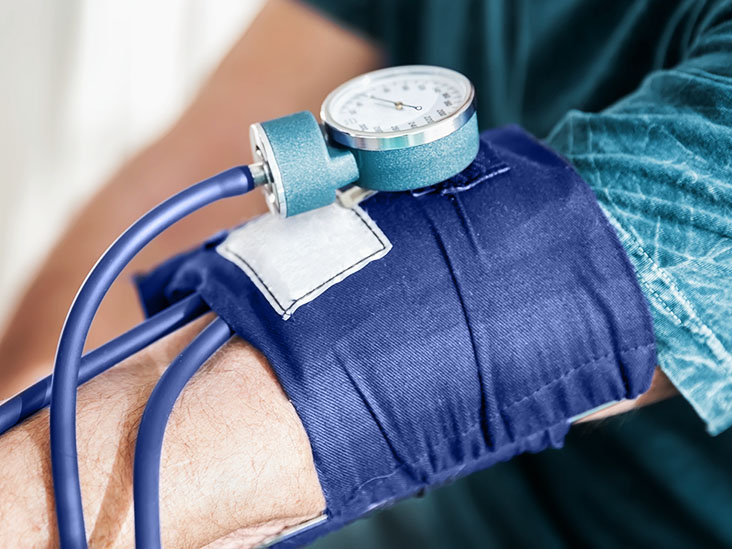High blood pressure or hypertension is when the force of the blood flowing through blood vessels is regularly too high. Menopause is when a person stops having a menstrual cycle. It is a natural part of aging that begins when a person’s estrogen levels start to decline.
Neither high blood pressure nor menopause is a disease. However, both raise the risk of developing diseases. Menopause also raises the risk of a person developing high blood pressure.
This article outlines the relationship between hypertension and menopause and provides information on preventing and treating high blood pressure.
People often think of hypertension as a condition that primarily affects males, but this assumption is false. According to the American Heart Association, females account for almost 52% of deaths resulting from hypertension.
People’s blood pressure often increases as they age. As people age, they are also more likely to experience menopause. However, there are definite links between increases in blood pressure and the changes a person’s body undergoes when they experience menopause.
A person may experience blood pressure changes throughout the different stages of menopause, including during perimenopause and menopause and after menopause.
Perimenopause is where a person’s body begins making the transition to menopause. The prevalence of hypertension is higher in postmenopausal people than in premenopausal people. However, a
The 2015 study found that the prevalence of hypertension was significantly different between early and late menopausal transition. The prevalence of hypertension increased the further a woman was into her perimenopause.
A
According to Blood Pressure UK, a person’s risk of having a heart attack is five times higher after menopause than before. This is likely due to increased blood pressure.
People who are going through menopause experience a significant drop in the hormone estrogen. This hormone has a beneficial effect on blood pressure.
Firstly, estrogen has a vasodilative effect, meaning it helps promote blood flow by keeping the blood vessels open. Secondly, estrogen helps keep cholesterol levels low, and this helps prevent the narrowing and hardening of the arteries due to cholesterol deposits or plaques. As such, a person experiencing decreased estrogen levels as a result of menopause may be at increased risk of developing hypertension.
People who are going through menopause may also experience weight gain. Being 20 pounds or more overweight can increase the risk of high blood pressure, so menopause can inadvertently contribute to this risk.
According to a 2014 review, some
There is nothing that a person can do to prevent high blood pressure completely. However, they can take steps to minimize their risk of developing high blood pressure.
Doctors can recommend a variety of
There are many steps a person can take to manage their blood pressure and lower their risk of developing complications from high blood pressure. Examples
People, especially older adults, should have regular checkups with a doctor. These checkups can screen for a wide number of health conditions, including high blood pressure.
People who are going through perimenopause or menopause may experience symptoms related to their changing hormone levels. Anyone who experiences unpleasant or uncomfortable symptoms should contact a doctor, who may be able to offer medications to alleviate symptoms and prevent possible complications.
A person should also contact a doctor if they experience heart palpitations. Although these are a symptom of menopause, they can
People who have experienced menopause are at increased risk of high blood pressure compared to those who have yet to go through menopause. This increase in risk is primarily due to hormonal and bodily changes that occur during and after menopause.
There is nothing a person can do to eliminate their risk of developing hypertension. However, people can make lifestyle changes to maintain healthy blood pressure. These include exercising regularly, following a healthy diet, and reducing their intake of salt, caffeine, and alcohol.
Hypertension typically does not cause any symptoms, so the only way a person will know they have it is through regularly monitoring their blood pressure. A person who is at risk of developing high blood pressure due to menopause can speak with their doctor about regular blood pressure monitoring. People who already have a diagnosis of high blood pressure should take any medications their doctor prescribes in order to prevent complications, such as stroke.
Last medically reviewed on January 30, 2022
Depression is more common during menopause, but it is unclear if menopause directly causes it. Learn more about menopause and depression.
Menopause causes a variety of familiar symptoms, such as hot flashes, mood swings, and vaginal dryness — but can it cause a rash? In this article, we…
Fatigue is a common experience in perimenopause and postmenopause, and can range from mild to severe. Learn more about menopause fatigue.
During menopause, a person can experience hot flashes, vaginal dryness, and other changes. Find out how taking vitamins may help manage discomfort.
When does menopause start? Is it still possible to become pregnant? Here, find out the answers to these and other questions about menopause.
OUR BRANDS
